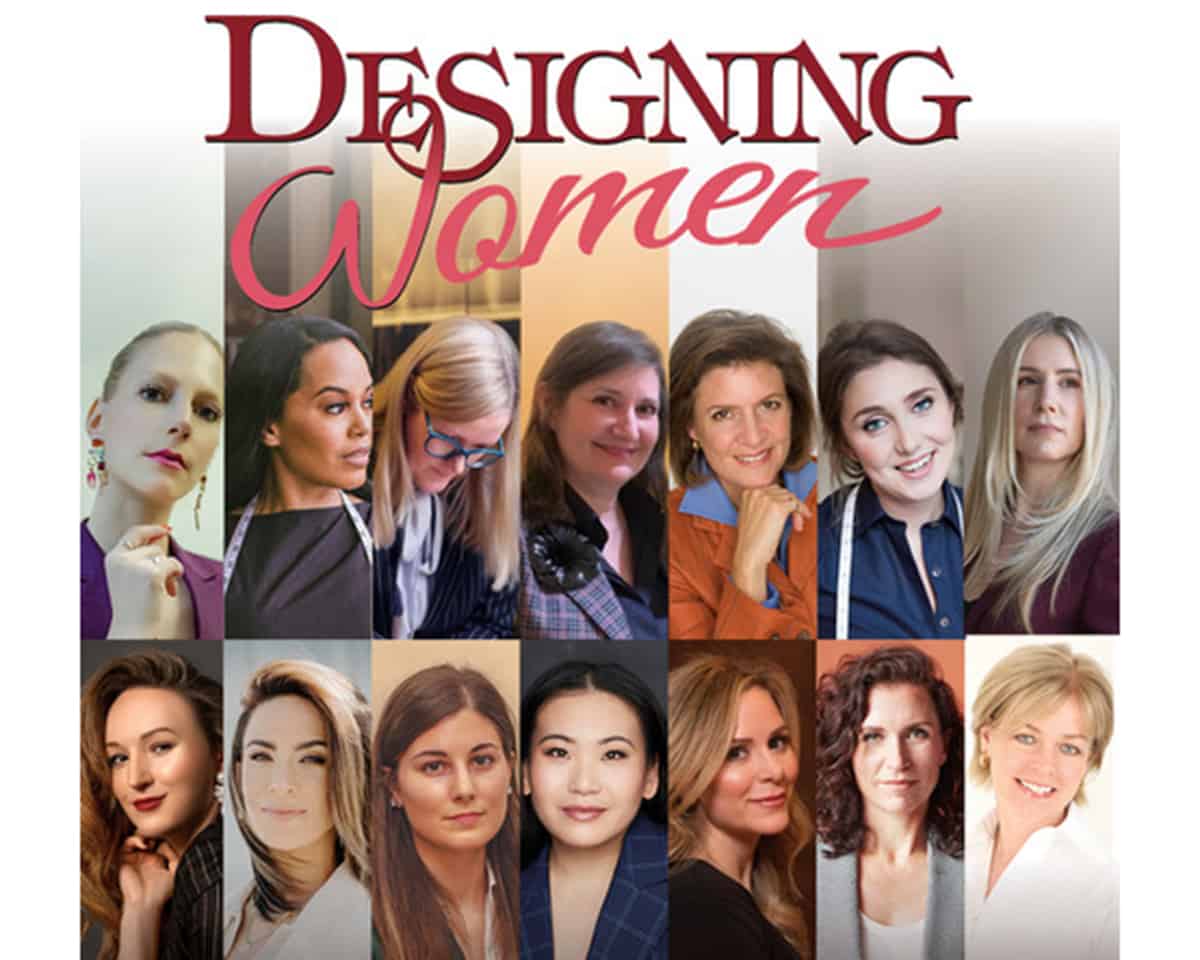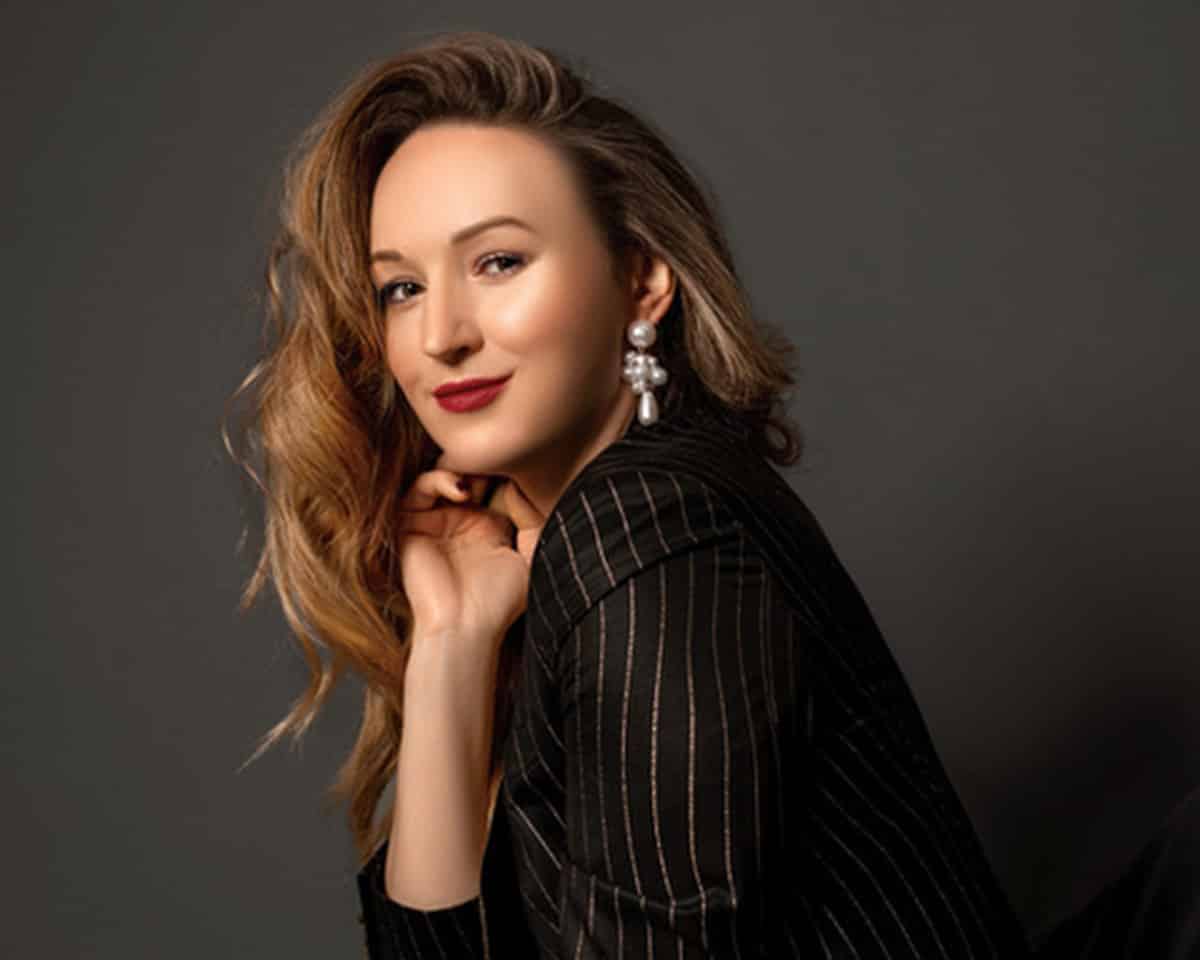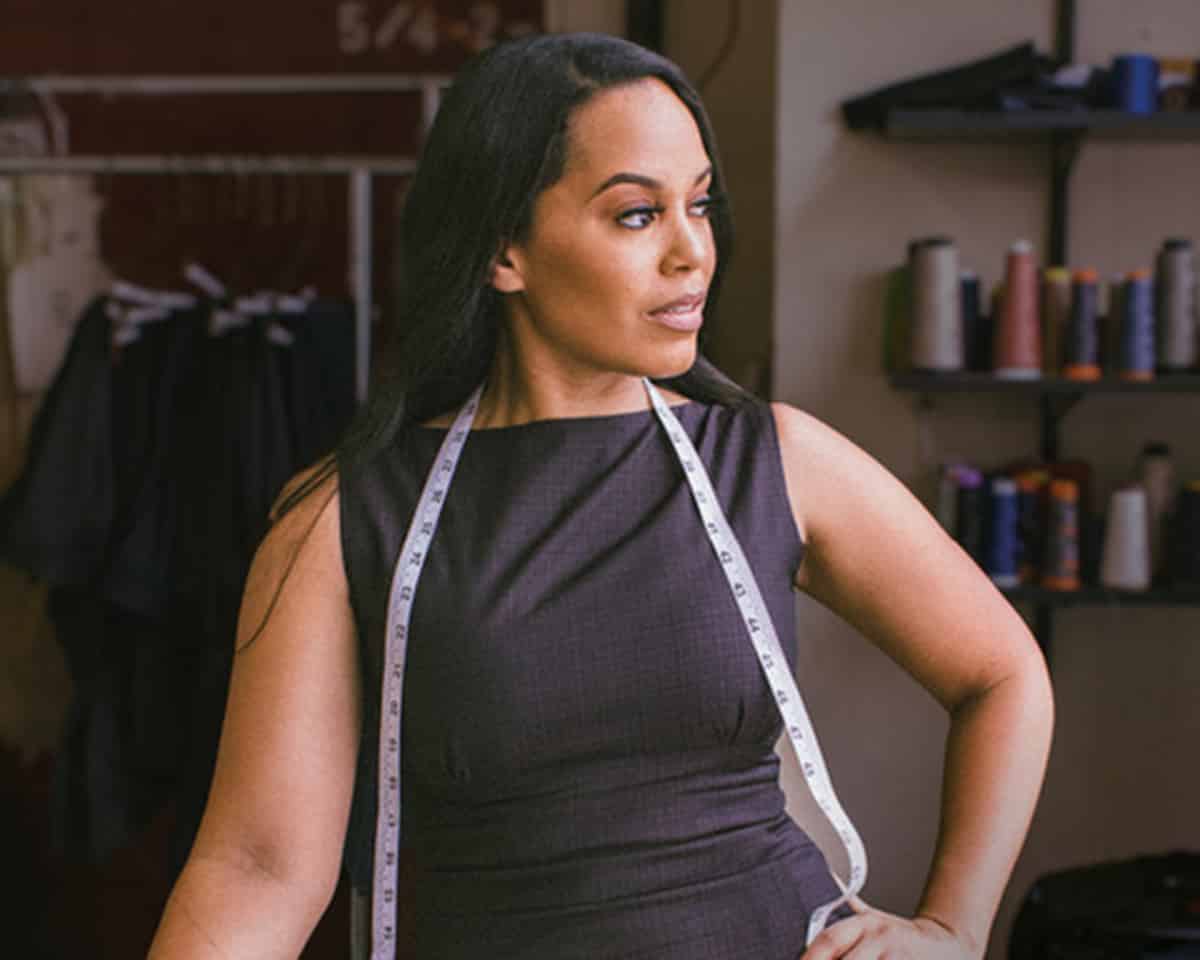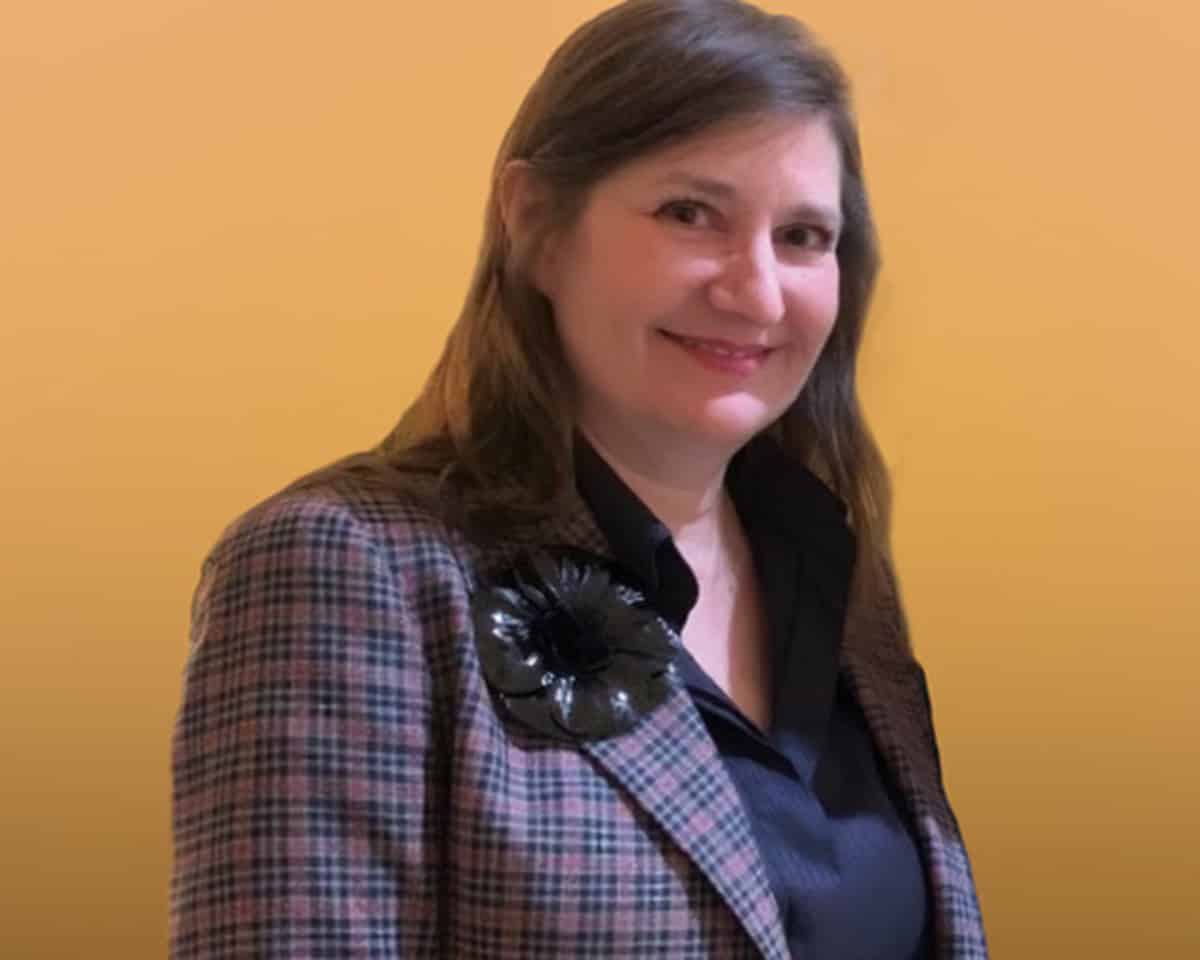CELEBRATING WOMEN’S HISTORY MONTH, DAY THREE

We’re celebrating Women’s History Month this week with Gladson New York, Huddersfield Fine Worsteds, and the Falconer Agency by shining a spotlight on the talented women designers, tailors, custom clothiers, and stylists who are making waves in menswear custom clothing. Over the past twenty years, the industry has seen exponential growth in women entering the menswear custom clothing market and they are doing very well. With a wink to the past, we call them ‘Designing Women’ as an homage to the 80’s comedy TV show, where power dressing, big hair, and big shoulder pads ruled the day.
Today we’re focusing on Ksenia Konovalova of Vestium in New York City. Vestium’s tagline is “Own Your Choices,” and the Ukrainian-American is building a business “based on inclusivity and celebrating people’s individual beauty regardless of race, age, sex or body type.” Yesi Lavin of Stitch Me Right in Queens, New York, brings her extensive resume to bear on helping others build their apparel businesses. Finally, Michelle Cherry, Gladson’s Midwest Account Executive, is a bespoke tailor in her own right: talk about product knowledge!
Ksenia Konovalova
Vestium
New York City
What brought you to tailoring/custom clothing?
I always joke that my passion for well-dressed gents led me to this wonderful career!
I am originally from Kyiv, Ukraine, and I received a master’s degree in finance from one of the leading universities in Eastern Europe. I’ve always been entrepreneurial and owned a few businesses in Ukraine. On a trip to New York in 2013, I met my future employer, Clifton Charles. A year later, he offered me a position to help him grow his successful custom tailoring business. Immediately, I fell in love with the power of a well-fitted, handmade suit. In 2015, I began a new venture with menswear designer Ian Rios. In 2018, I bought Ian’s stake to pursue my own vision for custom clothing. VESTIUM was born in February 2020.
How would you describe your business?
VESTIUM is a custom-couture brand specializing in suits. Our principles are inclusivity, innovation, and celebrating individual beauty, regardless of race, age, sex, or body type. VESTIUM is leading the way to preserve the great traditions of the sartorial past and bringing them into the 21st century. All of our creations are made with the utmost care and respect for craftsmanship, disregarding fast-fashion trends.
What is the makeup of your clientele?
Our clients include creative directors and brand specialists, business owners and CEOs, marketing directors, and finance professionals. They want to explore and upgrade their style, and perhaps even break some perceptions of what a suit should be.
What is the most rewarding part of your job?
Seeing the hard work pay off. Building a brand takes a lot of effort, time, and resources. It’s rewarding to watch collections and partnerships come to fruition after months of work, and to see the sparkle in clients’ eyes when they realize that their custom creation is many times better than what they envisioned.
What are the key stressors?
Time management, workload, and acquiring the right talent to help grow the brand. I’ve been burnt many times by hiring what seemed to be a great PR manager, marketing team, or a new assistant, only to realize that they couldn’t truly grasp the brand’s vision. Also, finding the right manufacturers in the U.S. and the need to work with Europe and/or Asia.
What distinguishes your business from the competition?
Our bold approach. I was able to bring two incredible creative directors to the Vestium team, who worked with some of the biggest and most successful brands in the U.S. With their help, we’re pushing the boundaries in design, fabrics, and what the custom suit brand can be in the 21st century.
From an industry perspective, what improvements are needed to make custom more profitable?
The biggest impact will be continued knowledge-sharing and exchanging contacts. Also, the U.S. needs to step up its manufacturing game. I had to move overseas when U.S. makers told me I couldn’t produce for women. Finally, training, training, and training. It hurts to see clothiers create custom pieces that don’t fit or are a bad design. I love what CTDA is doing, but events need to be more modern and promote the new generation. Put young professionals on the panels, hire them in leading positions, and train them. I appreciate Gladson’s efforts to build community here in NYC by putting together panels and educating people in the industry.
Now that we have entered a post-pandemic phase of Covid, have you needed to change your fashion models and/or your styling?
Covid made us adapt to the new reality that we are a lifestyle brand. We’re promoting a custom suit as something you wear for fun, to events and gatherings, and because it reflects who you are. We still sell classics but even then, clients want to add some spice to their choices. We hope to partner with somebody to create a collection of recycled materials that would look and feel good in a custom piece.
What type of training or schooling was required for you to become a tailor?
Almost a decade of hands-on experience plus a year-long Custom Tailors and Designers Association (CTDA) program to become a Certified Custom Clothier. I’ve also made trips to Italy twice a year to learn from the best and to visit mills in Biella and Como.
If you were to create a vision board that reflects your personal aspirations regarding your career, what might it look like?
Freedom. Gratitude. Being present. Positive energy and vibrations. Personal networking. Travel and supporting others. Email marketing that works and social media that results in sales.
Yesi Lavin
Stitch Me Right
Queens, New York
What brought you to tailoring/custom clothing?
My love for garment construction.
How would you describe your business?
Business consulting and coaching.
What is the makeup of your clientele?
Clothiers and business owners who want to fill gaps in their business that are hindering them from reaching their goals.
What is the most rewarding part of your job?
Seeing my clients live into their purpose or full potential, both in business and in their personal lives. Watching them go from lost to found when we provide them with the right resources to move forward.
What are the key stressors?
For my clients: Finding the right manufacturers, team building, online sales, digital footprint. I ask them, “How do you get people to bring not only their heads, but their hearts, to work?” They know how to do the job, but we also want them to love being there.
What distinguishes your business from the competition?
We’re a Godly business, We put the immediate needs of clients first, developing a tailor-made solution for each client. We break down their fundamental building blocks and stitch them right. We help our clients build their foundation on ROCK.
From an industry perspective, what improvements are needed to make custom more profitable for you?
Educating the sales force; technological Improvements.
What type of training or schooling was required for you to become a custom clothier?
I attended a vocational school and attained a Certificate of Proficiency in Fashion Design. I also hold an associate’s degree from Ai Miami International University. Through my general job experience, I’ve learned all aspects of the clothing business from the inseam out.
If you were to create a vision board that reflects your personal aspirations regarding your career, what might it look like?
You can have the greatest concept for a clothing business, but without the proper resources and mindset, you’re just a spool of thread, probably catching dust on a shelf.
Michelle Cherry
Gladson New York
Michigan
What brought you to tailoring/custom clothing?
Originally, I wanted to learn the skills to make clothing for myself. Then I started making them for friends and the business grew from there. My love of fabrics and tailoring brought me to Gladson where I now have this amazing opportunity to see the business from the merchant side, which is something totally new for me!
What was the most rewarding part of being a tailor?
The pleasure my customers get from feeling and looking their best in a well-fitting suit.
What were the key stressors?
Managing customer expectations. Fabric cannot be molded like metal. It drapes, and it’s going to wrinkle in certain places on the body. Sometimes that can’t be helped. Also, a tailored jacket is never going to feel like a sweater. It is inherently structured and can be a little constricting. Some people are so used to casual garments with stretch that they think a perfectly fitting suit should feel the same.
What type of training or schooling was required for you to become a tailor?
I have a bachelor’s degree in fashion design, but that doesn’t teach you what you need to know. You have to learn by apprenticing with master tailors and others who know the business and take the time to learn the craft.











